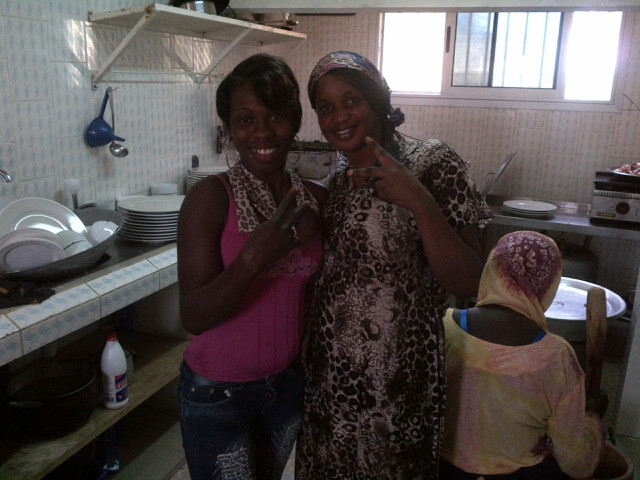
If Oumou Khairy Fall and Téty Fall are smiling in this picture, it’s because their lives are already better off—economically and socially—since the beginning of MCC’s investment in Senegal. And the work has just begun!
Both come from the northern village of Mboubéne in the Senegal River Valley, part of Africa’s dusty Sahel but the heartland of Senegal’s rice production zone. Production there is expected to increase by 10,500 hectacres by the time MCC’s five-year, $540 million compact ends in September 2015, and the dramatic improvements to irrigation channels, pumps and water conduits will help local rice farmers plant three crops per year instead of one.
That’s big news in a country that imports nearly 70 percent of its rice, Senegal’s main staple food.
Speaking of rice, Oumou and Téty would like to offer you some. They competed and won the right to manage the cafeteria for local contractor Eiffage Senegal, a contractor involved with the construction funded through the compact's $170 million Irrigation and Water Resources Management Project. It’s hot in Senegal’s north this time of year, and construction is hot, sweaty work that stirs up an appetite in a hurry.
Oumou smiles. “These men are always hungry,” she says. “And they come back and back for more.”
“I think they like our food,” laughs Téty.
Oumou and Téty start serving breakfast while the first rays of the sun are still throwing long shadows and the desert air is cool. The day’s heat will arrive in less than an hour as the Eiffage crew lines up for their first meal of the day. “Coffee,” Téty explains, “with lots of powdered milk, fresh bread and some stew.”
While the crew heads out to pour concrete and lay the iron rebar that will eventually bring the additional irrigation waters over the rice fields, Oumou and Téty begin preparing for lunch. When the sun is overhead, the temperature soars to well past 90 degrees. The Senegal River Valley swelters. The workers come back in for some nourishment, camaraderie—and shade. Lunch is a stew of local red beans in tomato sauce, a specialty of the region.
“It seems like no matter how many beans we buy in the market, we need more,” Téty explains. “These men are always hungry, and food is so important.”
Téty has neatly summed up just one way this project itself is important. When construction concludes in 2015, MCC’s investments in rice production and irrigation will help the Senegalese people get closer to meeting their demand for the staple. But it’s paying dividends already in the local economy. With well over $100 million in construction contracts ongoing in Senegal’s north, MCC’s investments are indirectly generating jobs for many hundreds of laborers, drivers, engineers, surveyors, community interpreters, social organizers, technicians, specialists, and more.
The impact these workers are having on the local economy—from food to gas to equipment to haircuts to lodging and more—is rippling through the Senegalese economy. The beans Téty purchases at the local market are just the beginning.
MCC’s program in Senegal places a special emphasis on gender equality from project design to implementation to evaluation, and these two women are an example of that. MCC’s construction contracts stipulate that women be given opportunities to join the workforce in whatever jobs they qualify for and are willing to do. Women are increasingly taking up positions such as flag person, gas station attendant and warehouse overseer. Moreover, if Senegal has any female welders, they are to be given an equal chance to work.
There are many opportunities for women to benefit from the sudden influx of capital and labor in Senegal’s north. This cafeteria is just one of them.
The compact is expected to benefit more than 1.1 million people over the next 20 years. As I finish my scalding hot glass of attaya—sweet, Senegalese tea—I watch Oumou and Téty manage their kitchen as the lunchtime crew cleans their plates and prepares to head back out for the afternoon’s work. I’ll be proud when this program is complete, and the people of Senegal benefit from this investment. But I’m even prouder to see the impact the investment is already having.

